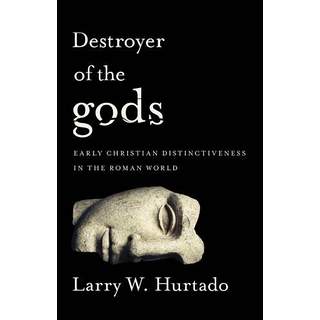BEN: You go on to compare and contrast the Stoic ethics of a Musonius Rufus with that we find in Paul and elsewhere in the NT, and you make the valid point, I think, that the Stoic teacher is offering a sort of ethic for ascetical athletes that are his understudies, not for everyone, whereas the ethic of Paul is a community ethic. But isn’t the early Jewish ethic of say Philo also a community wide ethic? How different is the scope of Christian ethic from early Jewish ethics? If I were pressed on this point, I would suggest: 1) that there is an intensification of demand in regard to things like marriage and divorce, which affects sexual ethics of course; 2) I think, as you have pointed out, there is a more egalitarian thrust to the Christian ethic, eliminating the double standard; 3) the emphasis on it being acceptable to be single for the service of the Lord (1 Cor. 7) if one has the gift for it, seems to be rather distinctive from the Jewish demand that all able bodied Jews, ‘be fruitful and multiply’. Would you agree or add anything to this list? You are surely right that the presupposition behind intensified ethical demands is that God has now given his eschatological Spirit who enables people to actually change their beliefs and behaviors.
LARRY: Again, Philo’s ethical standards were those he expected of fellow Jews, and he didn’t seek to programmatically promote them among gentiles. Your list of features of early Christian sexual ethics seems cogent to me.
BEN: When it comes to the household codes, it appears to me that the social strategy of the earliest Christians was: 1) start with people, households where they are, 2) inject the leaven of the Gospel into those household structures and let that work change; 3) change involved treating all members of the household as responsible moral agents and it also meant some very notable strictures on the head of the household who played three roles— master, husband, father, something no other member of the household played. 4) if there was progress towards a more Christian ethic in the household, then the second step could be taken, as we see in the development of Colossians in the direction of Ephesians where we hear ‘submit to one another out of reverence for Christ’ not merely wives submit to husbands, and we hear that the master of the house should serve his servants, not just the reverse, and then finally 5) in dealing with a slave owner who is a close associate we get to third order moral discourse about slavery— namely, if someone is a brother he ought not to be a slave any more, therefore there is the request to manumit him by Paul. In other words, there is a trajectory of change in these texts when compared one with the other, a trajectory away from a harsh patriarchalism, a misuse of slaves, and a double standard ethic and treatment of women towards a more egalitarian one. Would you agree with this synopsis of an argument about the household codes?
LARRY: I’m not so sure (not yet, at least) that the trajectory you sketch is valid. Maybe. I’m just not so sure that we have the evidence to put it all together as you propose. For example, it’s not all that clear that Christians felt that any of their slaves who became a believer must be manumitted. We know that Christian churches sometimes paid for manumission of Christian slaves in pagan households, but that’s not quite what you seem to urge. As I write in Destroyer, I think that the NT household codes are mainly different in the setting in which they were delivered/taught, and in the way that they address directly the various kinds of individuals as moral agents.
BEN: If I were to sum up what you see as the residue of the influence of Christianity on modern western thinking about religion it would be: 1) the default to think in terms of one God we owe to the widespread influence of evangelistic Christianity; 2) the tendency to separate religion out from other affiliations such as nationality, language etc. we owe to Christianity; 3) the tendency to see religion as a matter of personal choice rather than something one is born with and stuck with, we owe to Christianity; 4) the strong emphasis on theologically grounded ethical behavior we owe to Christianity. Is this a fair summary?
LARRY: I’d add (as I have a whole chapter on the matter) the notion that “religions” have “scriptures.” Many, perhaps most throughout history, didn’t and don’t. As to point 4, even the notion that “religion” = do’s and don’ts comes from Christianity. Down through history, most of what we’d call “religion” hasn’t particularly focused on guiding daily behavior.
BEN: THANK YOU LARRY FOR AN EXCELLENT DISCUSSION AND FOR ALL YOUR HARD WORK IN CONTINUING TO PRODUCE EXCELLENT SCHOLARSHIP ON EARLY CHRISTIANITY! Here’s a link to his book—-Baylor UP website: http://baylorpr.es/sHurtado













